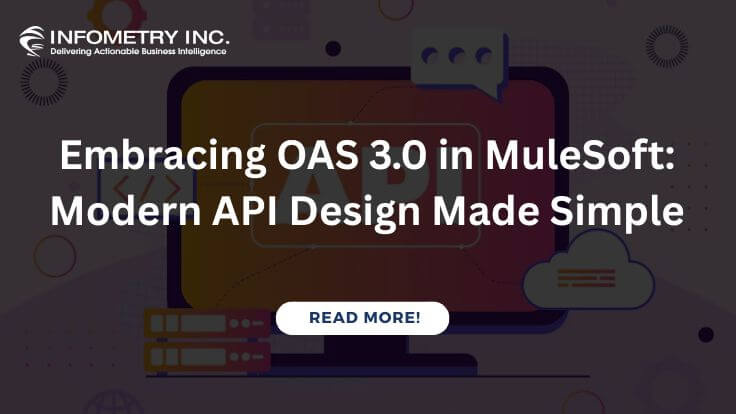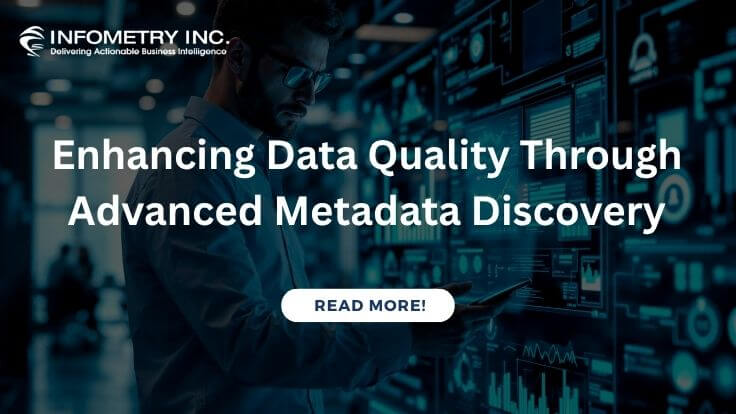
Unraveling the Secrets of Enterprise Performance Management
March 19, 2024
Streamlining Data Pipelines with Matillion’s Automation
March 25, 2024In today’s data-driven world, organizations are constantly grappling with the challenges of managing vast amounts of information. To harness the true potential of their data, businesses are turning to Enterprise Metadata Management (EMM) solutions, and one notable player in this space is Infometry. In this blog post, we’ll explore the importance of EMM and how Infometry contributes to effective metadata management.
Understanding Enterprise Metadata Management (EMM)
EMM is a comprehensive approach to managing metadata across an entire organization. Metadata, or data about data, plays a critical role in understanding, organizing, and utilizing information effectively. EMM encompasses processes, governance, and tools to create a centralized repository of metadata, ensuring its consistency, accuracy, and accessibility.
The key components of EMM include a metadata repository, governance policies, integration capabilities, search and discovery tools, and features for data lineage and impact analysis. These elements work together to provide a holistic view of an organization’s data landscape.
The Importance of EMM
Data Understanding and Interpretation:
EMM facilitates a deeper understanding of data by capturing information about its structure, relationships, and usage. Infometry’s EMM solutions excel in providing a user-friendly interface for intuitive exploration and interpretation of metadata.
Data Quality and Consistency:
Ensuring data quality and consistency is paramount. Infometry’s EMM tools enforce metadata standards and governance, contributing to reliable data that forms the foundation for informed decision-making.
Compliance and Risk Management:
Many industries face stringent regulatory requirements for data management. Infometry’s EMM solutions assist organizations in complying with regulations, offering robust documentation and control over data processes.
Efficient Data Integration:
With organizations dealing with diverse data sources, EMM streamlines the integration process. Infometry’s expertise in connecting and integrating metadata from various sources ensures a unified view, simplifying complex IT environments.
Change Management:
Managing changes to data structures and processes is a delicate task. Infometry’s EMM tools provide insights into data lineage and impact analysis, empowering organizations to handle changes in a controlled and efficient manner.
Enhanced Collaboration:
Infometry’s EMM solutions promote collaboration by providing a common understanding of data across different teams. This collaborative environment fosters better communication and coordination in data-related activities.
Infometry’s Contribution to EMM
Infometry stands out in the EMM landscape with its innovative solutions designed to address the evolving needs of organizations:
Robust Metadata Repository:
Infometry offers a centralized repository that efficiently stores organizes, and manages metadata. This repository serves as a single source of truth, ensuring consistency and accessibility.
Intuitive User Interface:
Infometry’s EMM solutions boast an intuitive user interface, making it easy for users to search, explore, and discover relevant metadata. This user-friendly experience enhances the efficiency of data management.
Advanced-Data Lineage and Impact Analysis:
Infometry’s tools provide advanced data lineage and impact analysis features, allowing organizations to trace the origins of data and assess the potential impacts of changes accurately.
Customizable Governance Policies:
Recognizing that each organization has unique governance needs, Infometry’s EMM solutions offer customizable policies to ensure alignment with specific requirements and standards.
Scalable Integration Capabilities:
Infometry’s expertise in scalable integration ensures that organizations can connect and integrate metadata seamlessly, regardless of the complexity of their data ecosystem.
Enterprise metadata management: Use cases
Enterprise Metadata Management (EMM) is a versatile solution that addresses various organisational use cases. Here are several key use cases where EMM proves to be beneficial:
Data Governance:
Challenge: Organizations often struggle to maintain consistent data definitions, standards, and quality across various departments.
EMM Solution: Establishing and enforcing data governance policies through EMM ensures that there is a unified understanding of data elements, their definitions, and usage across the enterprise.
Compliance and Regulatory Requirements:
Challenge: Many industries face strict regulatory frameworks requiring proper data management and documentation.
EMM Solution: EMM helps organizations adhere to regulatory requirements by providing a centralized repository for metadata, ensuring that data processes are documented and auditable.
Data Lineage and Impact Analysis:
Challenge: Understanding the flow and transformations of data is crucial for change management and impact analysis.
EMM Solution: EMM tools trace data lineage, allowing organizations to visualize the journey of data from its source to its destination. This aids in impact analysis, helping teams understand the consequences of changes to data structures or processes.
Metadata Search and Discovery:
Challenge: Locating and understanding relevant data quickly is a common challenge, especially in large organizations with diverse data sources.
EMM Solution: EMM provides search and discovery capabilities, enabling users to easily find and explore metadata. This speeds up data-related tasks and promotes efficient data utilization.
Data Integration and Interoperability:
Challenge: Organizations often deal with data from diverse sources that need to be integrated for a unified view.
EMM Solution: EMM facilitates the integration of metadata from various systems, ensuring that data from different sources can be harmonized and used cohesively.
Master Data Management (MDM):
Challenge: Inconsistent or duplicate master data can lead to operational inefficiencies and decision-making errors.
EMM Solution: EMM supports Master Data Management by providing a centralized repository for master data definitions, ensuring consistency and accuracy in the use of critical business data.
Business Intelligence and Analytics:
Challenge: Effective business intelligence and analytics depend on accurate and well-understood data.
EMM Solution: EMM enhances BI and analytics by providing a clear understanding of the data landscape, making it easier for analysts to work with reliable and well-described datasets.
Collaboration Across Teams:
Challenge: Lack of a common understanding of data can hinder collaboration across different business units.
EMM Solution: EMM fosters collaboration by providing a shared repository of metadata. This ensures that teams across the organization have a common understanding of data elements, fostering better communication and coordination.
Data Quality Management:
Challenge: Maintaining data quality is a constant concern for organizations dealing with large volumes of data.
EMM Solution: EMM supports data quality management by enforcing standards and providing visibility into data lineage, allowing organizations to identify and address issues affecting data quality.
Data Migration and Transformation:
Challenge: During data migration or transformation projects, understanding the impact on data elements is crucial.
EMM Solution: EMM’s data lineage and impact analysis capabilities help organizations plan and execute data migration or transformation projects with confidence, minimizing risks and ensuring a smooth transition.
Enterprise metadata management: What’s next?
The field of Enterprise Metadata Management (EMM) is continually evolving to meet the changing needs of organizations in an increasingly complex and data-driven landscape. Several trends and developments point towards the future direction of EMM:
Integration with Advanced Technologies:
EMM is likely to integrate with advanced technologies such as artificial intelligence (AI) and machine learning (ML). These technologies can enhance the automation of metadata management processes, improve data discovery, and provide more intelligent insights into data relationships.
Semantic Metadata Management:
The focus may shift towards semantic metadata management, which involves capturing not only technical metadata but also the semantic meaning of data. This can improve the understanding of data context and support more advanced analytics and decision-making.
Cloud-Based EMM Solutions:
As organizations increasingly adopt cloud technologies, EMM solutions are likely to evolve to be more cloud-native. This includes providing scalable, flexible, and easily accessible EMM solutions that can adapt to dynamic cloud environments.
Data Fabric and Data Mesh Concepts:
EMM may align with the emerging concepts of Data Fabric and Data Mesh. These approaches advocate for a distributed and domain-oriented model for managing data across the enterprise, emphasizing decentralized ownership and governance.
Enhanced Data Privacy and Security Measures:
With growing concerns around data privacy and security, future EMM solutions may place a stronger emphasis on ensuring the proper handling and protection of sensitive metadata. This includes features to manage metadata access, audit trails, and compliance with data protection regulations.
Greater Automation and AI-driven Insights:
Automation will likely play a more significant role in EMM, streamlining metadata management processes, and reducing the manual effort required. AI-driven insights can help automatically identify metadata relationships, patterns, and anomalies.
Interoperability Standards:
To promote seamless interoperability between different EMM solutions and data tools, industry-wide standards may be developed. This can facilitate smoother data integration and collaboration between diverse systems.
Evolution of Collaboration Tools:
EMM tools may evolve to include more collaborative features, enabling teams to work together more effectively on metadata-related tasks. This could include features such as real-time collaboration, comments, and annotations on metadata.
Greater User-Friendly Interfaces:
EMM tools are likely to focus on providing more user-friendly interfaces to cater to a broader audience within organizations. This can empower business users, data analysts, and other non-technical stakeholders to interact with metadata easily.
Real-time Metadata Management:
The need for real-time data insights is growing, and EMM may evolve to support real-time metadata management. This can enable organizations to make faster and more informed decisions based on the most up-to-date metadata.
Focus on Data Catalogs and Data Marketplaces:
EMM may increasingly emphasize the development of robust data catalogues and data marketplaces, providing a centralized hub for discovering, understanding, and accessing data assets within the organisation.
In summary, the future of Enterprise Metadata Management is likely to involve a combination of advanced technologies, improved usability, enhanced security measures, and alignment with broader data management trends. As organizations continue to recognize the importance of metadata in their data strategies, the evolution of EMM will play a crucial role in enabling effective data governance and utilization.
Conclusion
In conclusion, Enterprise Metadata Management is a crucial component of successful data management strategies, and Infometry’s solutions play a pivotal role in unlocking the power of metadata. By offering a comprehensive suite of tools and features, Infometry empowers organizations to harness the full potential of their data assets, ensuring data quality, compliance, and efficient collaboration across the enterprise. As businesses continue their journey into the era of big data, Infometry’s commitment to innovative EMM solutions positions them as a valuable partner in the quest for data excellence.





